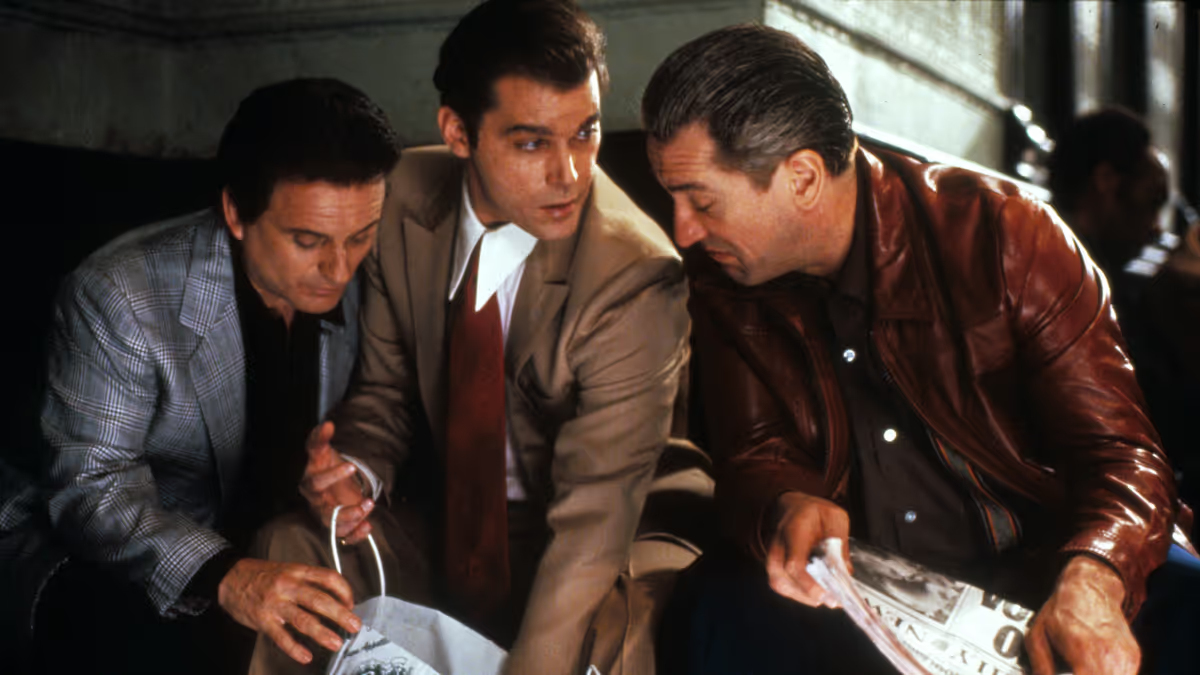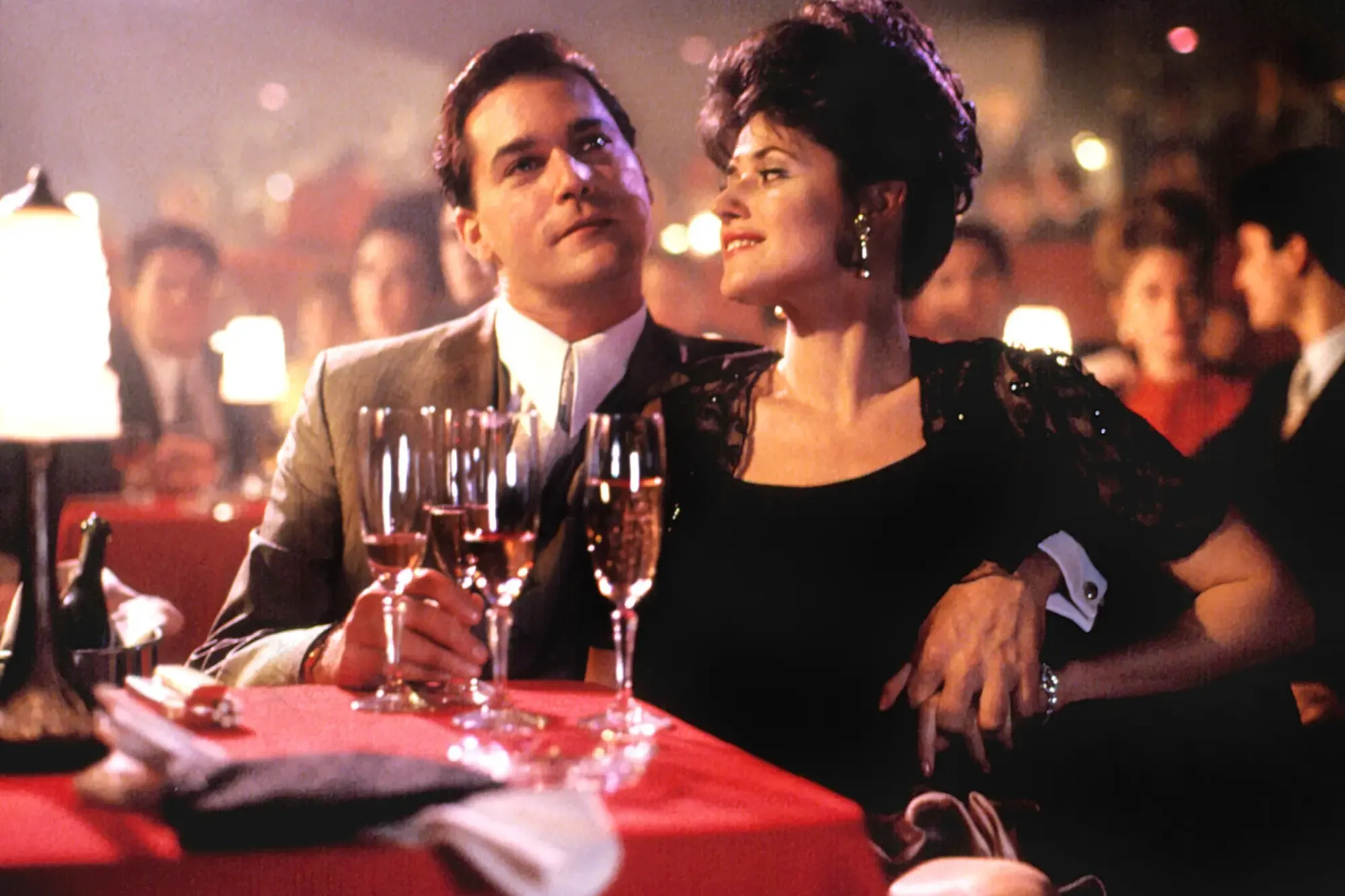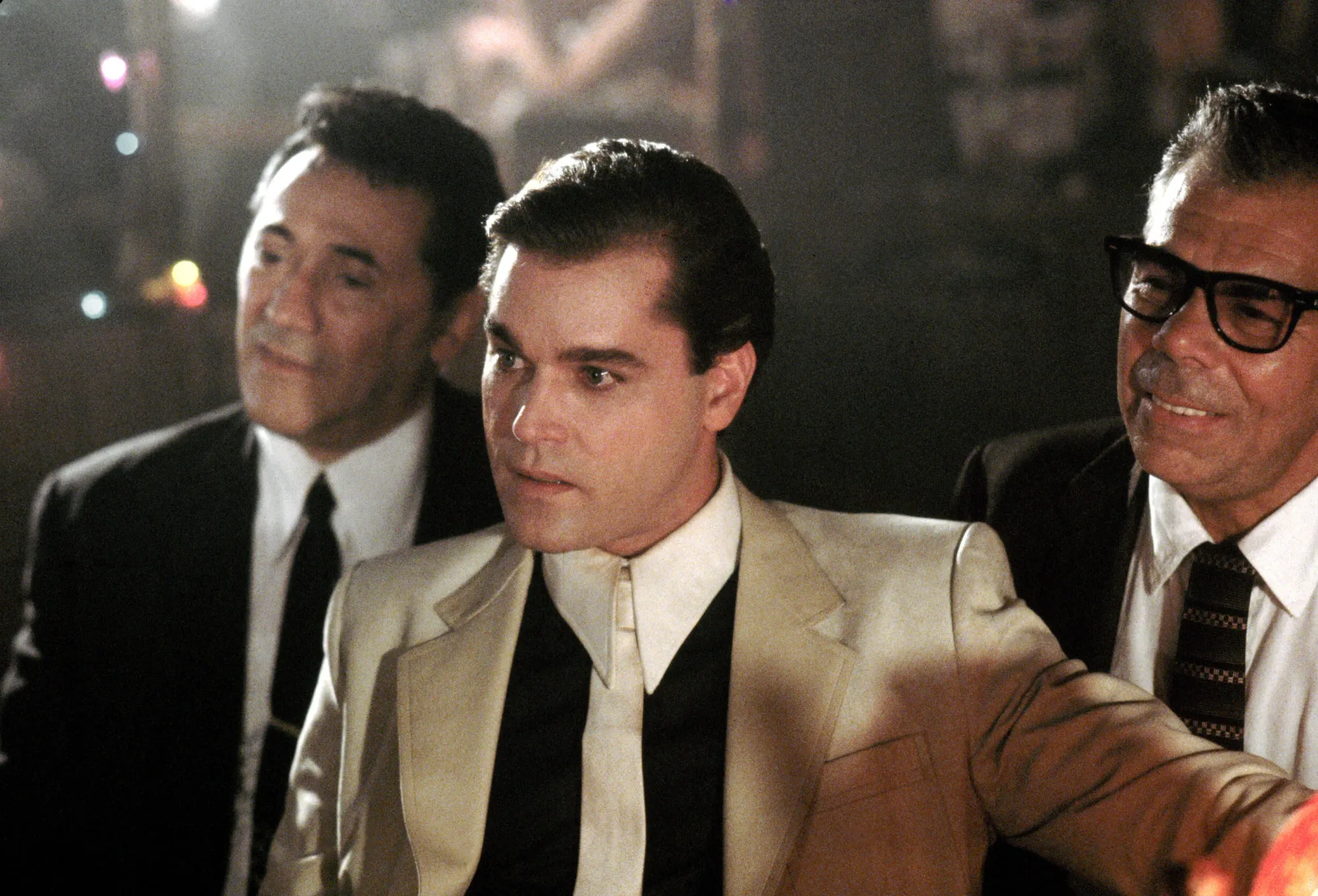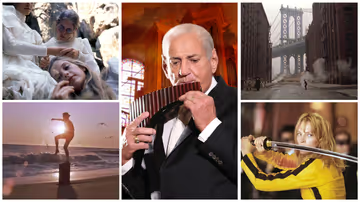#63 (tie): ‘Goodfellas’’: The Reveal discusses all 100 of Sight & Sound’s Greatest Films of All Time
Martin Scorsese's kinetic gangster doubles as an interrogation of the American dream.

On December 1st, 2022, Sight & Sound magazine published “The Greatest Films of All Time,” a poll that’s been updated every 10 years since Bicycle Thieves topped the list in 1952. It is the closest thing movies have to a canon, with each edition reflecting the evolving taste of critics and changes in the culture at large. It’s also a nice checklist of essential cinema. Over the course of many weeks, months, and (likely) years, we’re running through the ranked list in reverse order and digging into the films as deep as we can. We hope you will take this journey with us.
Goodfellas (1990)
Dir. Martin Scorsese
Ranking: #63 (tie)
Previous ranking: #176 (2012)
Premise: Based on Wiseguy, Nicholas Pileggi’s 1985 nonfiction about the life of New York City mobster Henry Hill, Goodfellas chronicles Hill’s involvement with a crime family from his adolescence in the mid-’50s through the early ‘80s, when he enters witness protection after testifying against his longtime associates. In between, Henry (Ray Liotta) is part of a three-man crew that includes ringleader Jimmy Conway (Robert De Niro), who specializes in hijackings and robberies, and Tommy DeVito (Joe Pesci), a loose cannon whose deep insecurities often lead to violent outbursts. He also embarks on a rocky marriage with Karen (Lorraine Bracco), who sinks reluctantly into their criminal life. As Henry’s risky ventures draw more attention from the authorities, he’s forced to break a cardinal rule: “Never rat on your friends and always keep your mouth shut.”
Scott: Keith, I normally take copious notes on all of the films we do for this project, so I refer back to quotes or scenes or observations that might be useful for our conversation. This was not necessary for Goodfellas, a film so vivid and electric at every moment that it’s been seared into my memory. Also seared in my memory is the first line of Pauline Kael’s review: “Martin Scorsese’s Goodfellas has a lift.” Indeed it does, Ms. Kael. There’s so much pop to Goodfellas from the very beginning, when even the opening credits are zipping by at the speed of highway traffic and we’re thrown into a scenario where Henry, Jimmy, and Tommy hear a thump in the trunk of the car and have to finish off the made man they thought they’d killed. Then we get the freeze-frame on Henry and the film’s first and most famous piece of voiceover narration: “As far back as I can remember, I always wanted to be a gangster.”
The Reveal is a reader-supported newsletter dedicated to bringing you great essays, reviews and conversation about movies. While both free and paid subscriptions are available, please consider a paid subscription to support our long-term sustainability.
We can dig into the technique later and the compelling, varied rhythms that Scorsese and his editor, Thelma Schoonmaker, create throughout the film. But one thing I’ve been thinking about recently with Scorsese that comes into play in Goodfellas is his jaundiced vision of the American dream, as seen through the eyes of rule-breaking outlaws. Tribalism is a theme in films like Mean Streets, Gangs of New York, Casino, The Wolf of Wall Street, and even Killers of the Flower Moon, where the lawless “tribe” is not Native Americans, but white supremacists who are conspiring to take the oil riches they feel entitled to claim, even though it’s not theirs. And this is where we start with Goodfellas, with Henry Hill reflecting on his youth in a working-class Italian/Irish neighborhood where he looked around and intuited the path to prosperity.
Among the rogues in a Scorsese film, the American dream for marginalized groups isn’t achieved through the proud tradition of, say, immigrant parents grinding out a tough living in order to open up opportunities for their children. It comes through identifying a shortcut and seizing a chance to live above the law, where riches and “respect” are gained through violence and intimidation, and gaming the system in various ways. (Casino and The Wolf of Wall Street make the additional point that these outsiders are exploiting the same capitalist system of “legitimate” operations like corporations and Manhattan investment firms, but that’s a conversation for another time.) Goodfellas is framed by that line of thinking from Henry: His reflections on a youth admiring (and then joining) the neighborhood goons who could have anything they wanted are bookended by the bitter reality of living a normal life under witness protection, when he orders spaghetti with marinara sauce and gets “egg noodles and ketchup.” “I’m an average nobody,” he says in the film’s final lines. “I get to live the rest of my life like a schnook.” A schnook like his father, for example.

Sin and the wages of sin are also major themes in Scorsese’s work, and Goodfellas is a wonderful articulation of them, because it benefits so hugely from the seductive qualities of a master director. It’s one thing to talk about the temptations of a gangster’s life, but it’s another to communicate its appeals so strongly to the audience, to where they can understand why such a wayward moral path makes sense. That’s why the character of Karen is so important to the film: We might expect a kid like Henry to slip into gangsterism eagerly, but Karen has to be won over by it. And so we get sequences like the famous tracking shot through the kitchen at the Copacabana nightclub, where Henry guides her around the schnooks who have to wait in line, through this special entrance, and into a space where the wait staff sets up a table with great sight lines just for them. Money gets passed around, champagne gets poured, a crooner sings something romantic from the stage… How can Karen not be overwhelmed by that? When they get to the wedding and receive those envelopes fat with cash, Scorsese again turns the focus on Karen, who’s made almost woozy by it. She doesn’t have to drink to feel drunk.
There’s so much to talk about with Goodfellas, Keith, but I wanted to get your impression of Henry Hill. Because even though the film was extremely well-received at the time—not well-received enough to top Dances with Wolves at the Oscars, but I digress—there was some criticism directed toward Henry’s character and Ray Liotta’s performance as being a weak central piece. I think that criticism was extremely misguided, of course, and that Henry has a lot in common with Harvey Keitel in Mean Streets, a low-level hoodlum who’s a little bit passive and whose fate is tied to a much more volatile friend. (In that case, De Niro’s Johnny Boy and here Pesci’s Tommy DeVito.) But Liotta had earned a reputation for playing quick-tempered Johnny Boy/DeVito types in films like Something Wild and Field of Dreams, and Goodfellas turns him into a more passive protagonist, someone more drawn into the criminal life than displaying a lusty appetite for it. It can be hard for any film, especially an epic on the scale of Goodfellas, to make a passive protagonist work. Does the center hold for you, Keith? What does Liotta bring to the table?
Keith: Scott, I’m glad you suggested starting with Liotta because a lot of my focus fell on his performance in this viewing. (How many times have I seen this movie? I have no idea, though it had been a while.) I’d forgotten Liotta/Henry used to be called out as the film’s weakest element. I think Henry’s passivity is, to use a worn-out phrase, a feature not a bug. A character with a stronger personality wouldn’t be nearly as effective a tour guide to this world. I think Henry delivers a few lines that explain who he is pretty succinctly early in the film:
If we wanted something, we just took it. If anyone complained twice, they got hit so bad they never complained again. It was routine. You didn't even think about it.
The “didn’t even think about it” part is key. Henry’s not stupid. In fact, he’s evidently quite clever. But thinking too much about what he does or how he lives makes him uncomfortable. Watching it this time, I was really struck by the moments when he has to think about it. When he participates in the murder of Billy Batts, his expression contrasts sharply with that of Jimmy and Tommy. The part of him that’s shocked by this casual killing hasn’t yet died. Or maybe he’s the only one who can see that there will be horrible consequences for killing a made man. Maybe both. You can see it again when Tommy kills Spider. He’s not as numb to this as the others. He can’t just pick up the card game again.
That might explain why he’s the one who becomes an addict. Tommy clearly drinks too much, but it’s Henry who picks up a soul-deadening coke habit. It’s a really interesting moment in the “May 11th, 1980” sequence when Henry goes to Jimmy’s house with the guns that Jimmy doesn’t want. Henry’s voiceover blames Jimmy but Jimmy — and our own eyes — tells us that Henry’s all messed up and making bad decisions, like showing up quite early in the morning with a bunch of guns he can’t use. Once again Henry is along for the ride, only this time it’s coke doing the driving.
Not to keep relitigating an old argument, but Liotta takes Henry on a journey in this film. His introduction as the grown-up Henry, framed against the diner, is so glamorous it’s hard to imagine him turning into the puffy, strung-out, sniveling Henry at the end of the movie. Yet every step along that path makes sense. The deeper Henry gets into the life, the more dangerous it becomes. Or maybe the danger just becomes harder to ignore. It goes without comment that Jimmy, Henry, and (for most of the film, anyway) Tommy are survivors, but the crew around them experience a lot of churn. Do we see, say, Jimmy Two Times again after his introduction? When our boys put together a crew for later crimes, they draw from an entirely different pool of goons. What happened to the other guys?
That touches on another aspect of this film I love, the way it suggests the passing of time. That’s not so much because of the way the characters age. (I don’t buy De Niro as a twentysomething when we first meet him, for instance, and Henry appears to remain the same age once Liotta takes over the role.) But the production design and the soundtrack create a sense of the years flying by in ways these guys can’t fully comprehend. We don’t see screaming protesters signalling we’re in the 1960s. They’re too deep into their bubble to notice anyway. Tommy’s date daring to suggest that she could see how a white woman might find Sammy Davis Jr. attractive comes as a shock. This is just not how people think and he doesn’t want to hear it. Songs slip through, too, with darker themes than the gang’s preferred soundtrack of Bobby Vinton, Tony Bennett, Jerry Vale, etc. Henry’s Pittsburgh connections are of a different breed of gangster. They’re the sort of creeps Paulie and his peers would have run off the streets. It’s a gradual process. Then, before they can do anything about it, the times leave them behind.
Scott, I’m going to say something controversial here: This is a pretty good movie. And it’s a group effort, but I’m always in awe of what Thelma Schoonmaker does here (and in every Scorsese film). The cutting in the scene where Karen holds the gun on Henry between the two characters and the close-up details of the pistol: amazing. Do you have a favorite bit of editing? Also, let’s talk about Karen whose voiceover and perspective become as key to the film as Henry’s once she’s introduced. Her own journey doesn’t follow a clear path. She’s mesmerized then disillusioned but she also becomes a full partner in the late stages of Henry’s career. That shot of them near the end where they’ve fallen asleep in each other’s arms is weirdly touching, at least until the camera pans down to reveal the gun in Henry’s hand. Do you have any thoughts on Karen and on Bracco’s performance?
Scott: I think Lorraine Bracco is terrific and her voiceover helps clarify and deepen her character. Scorsese has always been smart about using voiceover narration as a tool to bring us inside somehead’s head—in films like Taxi Driver, that’s an uncomfortable place to be—but one of the chief advantages for him is that it liberates the camera. Henry and Karen’s narration in Goodfellas seems like a dry run for Casino, which blankets the film with voiceover from all three main characters, who explain the complicated ins and outs of Las Vegas scams (legal and illegal) while the camera moves elegantly through space. Here it’s a stroke of genius for Scorsese to break the fourth wall in the courtroom at the end of the movie to have Henry speak to us directly, because we realize that he’s been telling us the story this entire time. We’re the audience for a long rationalization for why he joined the mob, the decisions he made over the years (or that were made for him), and his genuinely deflated feeling, in the end, that he has to live the rest of his life like a “schnook.”
Karen’s story, also assisted by voiceover, evolves into the making of a mob wife. She and Henry are a good match because they’re both passive types who allow themselves to get swept up (and seduced) by the criminal life while suppressing their occasional feelings of guilt about it. (I’m glad you focused on Henry’s reaction to the Billy Batts killing, because he doesn’t participate with anything like the lustiness of Tommy and Jimmy. In fact, the only time he seems comfortable with violence is when he beats the hell out of Karen's neighbor from across the street.) Scorsese doesn’t downplay the seductions of criminal life, from young Henry cutting the line at the bakery to Karen getting those incredible seats at the nightclub. I remember it being a bit controversial when Karen is asked to hide Henry’s gun. (“I know there are women, like my best friends, who would have gotten out of there the minute their boyfriend gave them a gun to hide. But I didn’t. I got to admit the truth. It turned me on.”) But she has to be morally elastic in order to make a relationship with a guy like Henry work.
What’s fascinating about Karen—and we’d see this again from a later mob wife in Carmelo Soprano—is how much she denies who she is. She’s repulsed by the garish, vulgar spouses of other mobsters and she continues to minimize her own complicity in Henry’s crimes to the bitter end, when she tries and fails to convince an FBI agent that she should be able to see her parents once she’s in witness protection. Yet the Hills do have a real marriage, through thick and thin, and they’re together on the same sad trajectory, as both find their opulent lifestyle (a remote-controlled living room wall!) shifting once Henry gets in the cocaine business and they start snorting up their own product. They both have consciences to numb and though we don’t hear from Karen in those final minutes, I don’t doubt that she feels their “normal” life in witness protection is a letdown. The closing credits inform us of their separation, which is like their relationship going out with a whimper.
Do you have a favorite sequence in Goodfellas, Keith? There’s just so many of them to choose from for me, which speaks to Scorsese’s ability to tell the larger story through a series of vivid, illustrative anecdotes. Yes, this is about the rise and fall of Henry and his crew, but the long timeline is conveyed through scenes that tell us something important about these characters and their world, rather than connecting events in a more conventional narrative flow. How do we know Tommy is a deranged sociopath? Through the famous “Am I funny?” scene, which makes sense of the Billy Batts killing later and the subsequent decision that Tommy isn’t “made man” material. (The shot of Tommy entering that empty room has become one of the film’s many memes, but the way Scorsese cuts him off at the “no” in “Oh no” is so chilling.) Back at The A.V. Club in 2007, we did a list titled “15 pop songs owned by movie scenes” and Derek and the Dominos’ “Layla” from Goodfellas made the cut, which is significant given the competition from other Scorsese movies alone. Tommy’s death comes at the end of that montage, which covers the fallout from the Lufthansa heist, but I can’t imagine a better song to convey the end of an era. That piano coda to “Layla” is the mournful gearshift to the song itself and to that part of Henry’s story.
Speaking of gearshifts, though, how about that day-in-the-life section? As a parent who’s often scrambling to pick up the kids, put various assignments to bed, get dinner together, and check off a long daily to-do list, I think about Henry’s day all the time. (“Gotta stir the sauce,” I mumble to myself.) But as you say, cocaine is the driver of Henry’s life at this point in Goodfellas and Scorsese, no stranger to the devil’s dandruff himself, is able to break sharply from the seductive textures of the earlier parts of the film and tap into this harried, paranoid, wildly chaotic time when his world is falling apart. Henry may have discovered this lucrative side business with the sleazy Pittsburgh hoods, but he doesn’t have the calm temperament of a leader like Paulie, who moves slowly (“Paulie didn’t have to move for anyone”) and who’s so careful about managing his affairs that he never uses the phone and only speaks through a small, trusted group of intermediaries. Meanwhile, Henry is relying on his babysitter and her “lucky hat” to get product and his coke-fiend mistress to make it street-ready. He’s heading full-throttle towards disaster.
What are the little details and moments that stick out to you, Keith? Are you as obsessed as I am about slicing garlic so thin it dissolves in the pan, like Paulie with the razor blade in prison? (I don’t have a razor, but I do have a kitchen gizmo for this specific purpose.) How charming is Catherine Scorsese as Tommy’s mother? The actors seem so delighted by her that Scorsese almost needs that cut away to the car truck to remind us that they have unfinished business to do.
Keith: I almost feel like Goodfellas resists the “What’s your favorite scene?” because so many of these scenes live in my head and resonate with everyday life. You mentioned the “Gotta stir the sauce” moment. As a freelancer, I’ve occasionally found myself reduced to feeling like Morrie when clients don’t pay on time. Nobody likes saying, “I want my money” over and over again, but when you want your money, what else are you going to say? Yes, he’s annoying, but he does have a point. (This reminded me that I needed to send another “I want my money” email to [redacted].)
As for favorite scenes, it might be obvious but that the “Layla” finding-the-bodies sequence is way up there. That coda is so lovely but its use here teases out some ominous currents to the song. I can still listen to it without thinking of corpses in meat freezers and garbage trucks, but the way Scorsese pairs it with those images and camera moves makes it the perfect counterpoint to the bitter harvest of the Lufthansa heist. We’ve traveled into far darker territory than we began and the consequences of these crimes greatly outweigh, say, boosting a truck full of Lucky Strikes.

I loved that stretch where Catherine and Charles Scorsese would turn up in movies, both Scorsese’s and others’. But it would just be a cute bit of stunt casting if it didn’t work. In Goodfellas, Ma Scorsese feels so natural playing the concerned mother who doesn’t understand her son’s career but is proud of him anyway, if a little leery of how he spends his time. OK, maybe this didn’t require so much acting on her part, but it’s hard to imagine anyone playing the role any better.
I want to talk a little bit about this film’s legacy by pinging off what you said about Karen and the unease around her line about being turned on by being asked to hide the gun. Part of this movie’s appeal is that it depicts violence as disgusting but also appealing. If Goodfellas didn’t seduce viewers into the gangster life, it’s depicting it wouldn’t work. That appeal curdles as the film progresses. If Billy Batts' murder isn’t turn-off enough, surely poor Spider’s fate is. It’s a tricky balance, and one other Goodfellas-inspired films have had trouble striking. It’s also one that’s lost on some viewers. As with The Sopranos, it sometimes feels like people who like this movie like it for all the wrong reasons. Should that matter?
Also, we should talk about how this fits into Scorsese’s other underworld films. I once saw some social media ignoramus (perhaps an MCU zombie) reduce Scorsese’s work to gangster movies. That’s wrong, of course, but it’s not like hasn’t made a few memorable gangster films, either. Put alongside Mean Streets, Casino, The Departed, and The Irishman (and maybe Gangs of New York, I guess) how does this film’s view of the world compare to its companions’?
Scott: Social media ignoramuses love to talk about Scorsese exclusively as a director of gangster movies, usually to justify their affection for homogenous corporate art. But I think if you’re going to do that, you have to talk about the gangsters in other Scorsese films, like the high-society gossips who conspire to snuff out a relationship in The Age of Innocence or the forces that gather to crucify Jesus in The Last Temptation of Christ. Gangs of New York is certainly part of that conversation, as is Killers of the Flower Moon, because Scorsese’s America is not a great melting pot, but tribalist battleground where various crews, from Long Island pump-and-dump scamsters to the ethnic gangs of Five Points to, yes, the mobsters of Boston, Brooklyn, and Little Italy. I think it’s reductive just to shrug any or all of these movies off as mere “gangster films,” because Scorsese is often expressing a bigger social dynamic in this heterogeneous country of ours and that’s a rich enough theme to build much of a career around.
As for what separates Goodfellas from the others, I suppose I see it as part of a progression from the low-level neighborhood shenanigans of Mean Streets to the large-scale scam of Las Vegas in Casino. A hero like Henry Hill is somewhere between those two worlds, with criminal aspirations that move him further up the class ladder than Charlie in Mean Streets without quite reaching the gaudy excess achieved by Ace Rothstein in Casino. I also think it’s peak Scorsese on a filmmaking level, as thrillingly caffeinated as Francis Ford Coppola’s The Godfather is moody and elegant. Goodfellas and The Godfather may be the two greatest gangster films ever made and their contrasts makes them so complementary.
And on the issue of people liking Goodfellas for all the wrong reasons, I guess that can’t be helped. I occasionally pick up party trays from a place in Chicago called Badabing Wings, where the entrance has an image of Tony Soprano picking up the newspaper in his bathrobe and the inside is littered with admiring posters from Goodfellas, The Godfather and other Italian-American gangster favorites. The vibe I get from Badabing Wings is certainly not “what a terrible scourge on society these gentlemen are” and I’m wary of folks who watch these films just for the whackings. (It was amazing to watch how much David Chase engineered those final seasons of The Sopranos to frustrate this specific type of viewer.) But Scorsese is no stranger to having his films taken the wrong way—though John Hinckley seems pretty chill these days—and I don’t think he should bear responsibility for it. He’s honest enough to show you the allure of gangster life, but if you come out of Goodfellas thinking, “Man, looks like a sweet gig,” that’s on you.
There are scoundrels afoot in our next discussion, Keith, but I don’t think any of us would feel terrible about identifying with the heroes of Casablanca, that sparkling jewel of Golden Age Hollywood. Here’s looking at you, Phipps!
Previously:
#95 (tie): Get Out#95 (tie): The General
#95 (tie): Black Girl
#95 (tie): Tropical Malady
#95 (tie): Once Upon a Time in the West
#95 (tie): A Man Escaped
#90 (tie): Yi Yi
#90 (tie): Ugetsu
#90 (tie): The Earrings of Madame De…
#90 (tie): Parasite
#90 (tie): The Leopard
#88 (tie): The Shining
#88 (tie): Chungking Express
#85 (tie): Pierrot le Fou
#85 (tie): Blue Velvet
#85 (tie): The Spirit of the Beehive
#78 (tie): Histoire(s) du Cinéma
#78 (tie): A Matter of Life and Death
#78 (tie): Celine and Julie Go Boating
#78 (tie): Modern Times
#78 (tie): A Brighter Summer Day
#78 (tie): Sunset Boulevard
#78 (tie): Sátántangó
#75 (tie): Imitation of Life
#75 (tie): Spirited Away
#75 (tie): Sansho the Bailiff
#72 (tie): L’Avventura
#72 (tie): My Neighbor Totoro
#72 (tie): Journey to Italy
#67 (tie): Andrei Rublev
#67 (tie): The Gleaners and I
#67 (tie): The Red Shoes
#67 (tie): Metropolis
#67 (tie): La Jetée
#66: Touki Bouki#63 (tie): The Third Man




Discussion